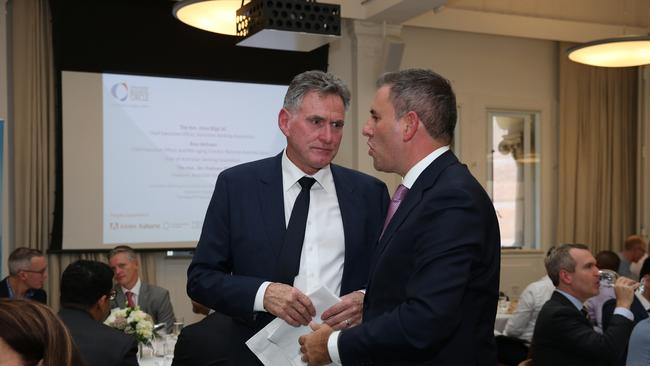NAB casts cautious tone amid housing crisis, economic slowdown
Outgoing NAB chief Ross McEwan, who will now join BHP’s board the day after he exits the bank, has cautioned Australia’s economic bounce-back won’t come easily.
National Australia Bank’s leaders have cautioned Australia’s economic bounce-back will not come without a decline in inflation, warning the country was facing a housing crisis which would constrain potential growth.
NAB chief executive Ross McEwan and his incoming replacement Andrew Irvine cast a restrained tone on the outlook for the country, noting key areas of business and borrowers were in stress.
Mr McEwan, who is set to leave the top job at NAB on April 2, said the bank’s profits were returning to a “more normal situation” after benefiting from a “sugar rush” in 2023, as the cash rate climbed.
Mr McEwan’s comments come as mining giant BHP announced it had appointed him as a new non-executive director, set to start on April 3, the day after he leaves the top job at NAB.
This marks his second board position announced in recent weeks after British weapons and tech manufacturer Qinetic confirmed he would join the company’s leadership.
NAB revealed a 17 per cent first quarter profit dip on February 21, with earnings trimmed to $1.8bn.
Mr McEwan said Australia’s economy was “tightening up”, but noted many NAB customers were still in “good shape”.
But incoming NAB CEO Andrew Irvine, set to replace Mr McEwan in April, said there were areas of pain, with landlords in office locations “struggling a little bit with interest rates”.
“Averages are still OK, the problem is averages don’t tell the whole story,” Mr Irvine said.

Mr Irvine said NAB was seeing office owners facing a pullback in demand as companies hand back space in recognition of a lack of need as many workers remain working from home.
The British-Canadian banker who will succeed Mr McEwan warned off optimism inflation had been defeated, after early data from the Australian Bureau of Statistics showed it unchanged at 3.4 per cent for the 12 months to January.
“Inflation is awful, you only have to talk to consumers who are struggling with the price of fuel, the price of groceries,” Mr Irvine said,
“It’s in everybody’s interest to get inflation under control, I am optimistic we are getting it under control,” he said.
Mr Irvine said he was pleased to see a “really good inflation print” from the United States overnight, noting hopes Australia would start to see the same trend.
“I think that will give the RBA the ability to look at interest rates and start to bring them down,” he said.
Mr McEwan said he hoped inflation figures would “fall to a three in front of them” by the end of 2024, declining “into twos” by 2025.
“But we’re still not predicting interest rates coming down until the final quarter of this calendar year,” he said.
Mr McEwan said tax cuts flowing through this year would help many consumers, noting inflation “has to be crushed to get this economy going”.
“I think Australia is still in a good position, we’ve got an economy that is growing stronger … but it’s slowing down and it’s feeling like it’s really slowing down,” he said.
“I’ve been very optimistic we won’t see a recession but we’re going to see two quarters of very low growth before it starts moving.”
Mr McEwan said Australia was also facing a barrier to growth from the restricted housing market, noting the country was undershooting its building needs by almost 50,000 homes per year.
But, the veteran banker warned quick fix solutions, such as turning unused office space into residential properties, would be “very hard” to pull off.
“There needs to be quite a transition to actually pull down some of those buildings and rebuild them from a residential perspective,” he said.
“I’ve been calling for state governments (to be) much faster on approvals.”
Mr McEwan said taxes on new developments were muting building activity, noting the array of big build infrastructure projects were also crowding out access to labour for housing.
“There’s so many workers to do the jobs, but there’s only so much concrete,” he said.
Mr McEwan leaves NAB as the banking industry faces down public inquiries over moves to shutter branches across the country, as well as questions over its pass-through of higher rates to savers.
The NAB boss, who took on the running of the bank in December 2019, said the sector had learned the lessons of the Royal Commission into Misconduct in the Banking, Superannuation and Financial Services Industry.
He said the supermarket sector, now facing its own public ire, had to rebuild trust with both “colleagues and your customers”.
Mr McEwan, credited with rebuilding NAB’s culture and structure after the royal commission, said companies under fire need to have “the trust of the people you deal with”.
“The royal commission was an absolute wake up call for the industry and I think the industry has learned a lot of lessons, you can’t forget the lessons,” he said.
NAB is also faced with replacing Mr Irvine, who has led the bank’s business lending arm since September 2020.
Mr Irvine hinted he would be carefully considering his successor in NAB’s most important operation, noting a female replacement was of interest.








To join the conversation, please log in. Don't have an account? Register
Join the conversation, you are commenting as Logout